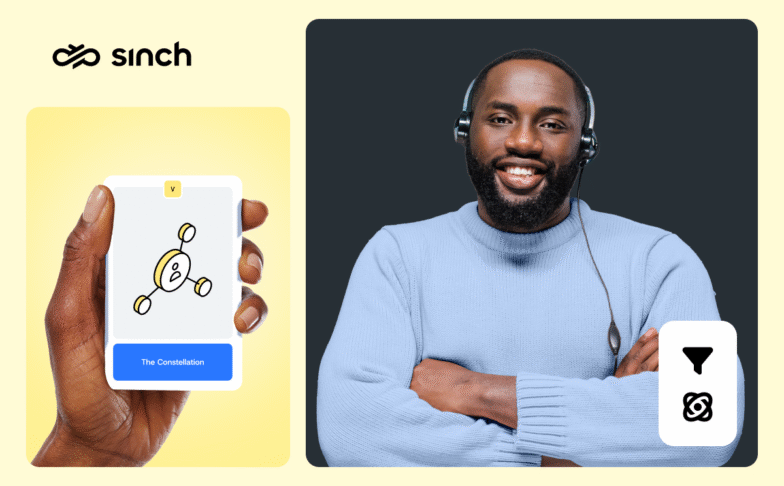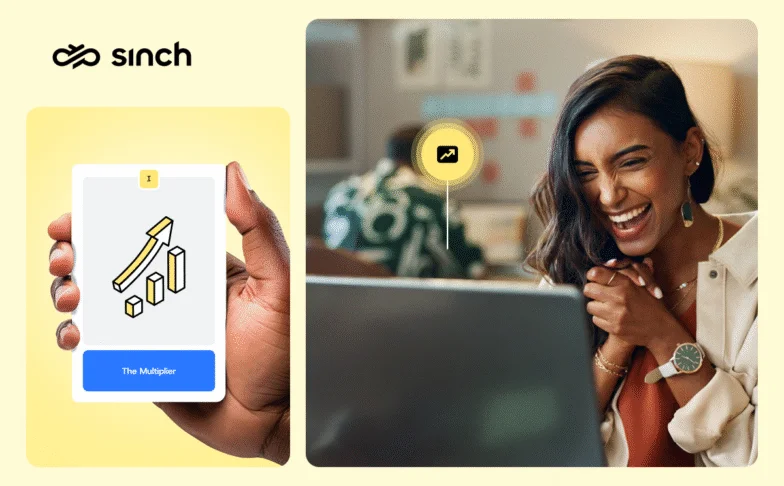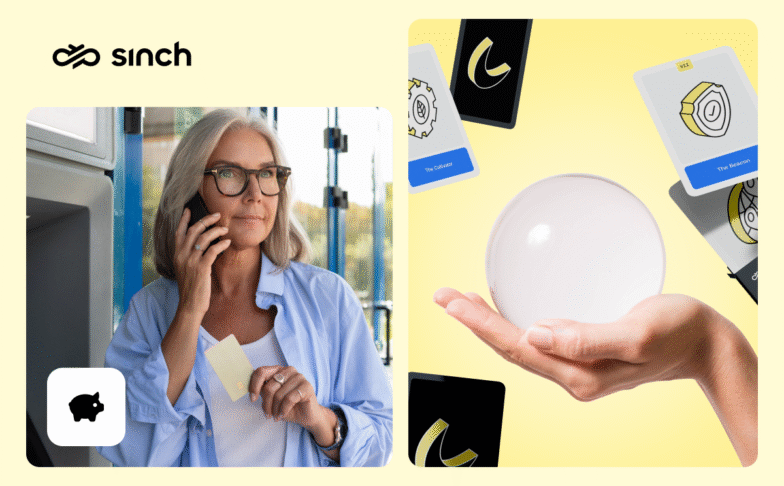Insights
What is a WhatsApp Business account, and how does it work?
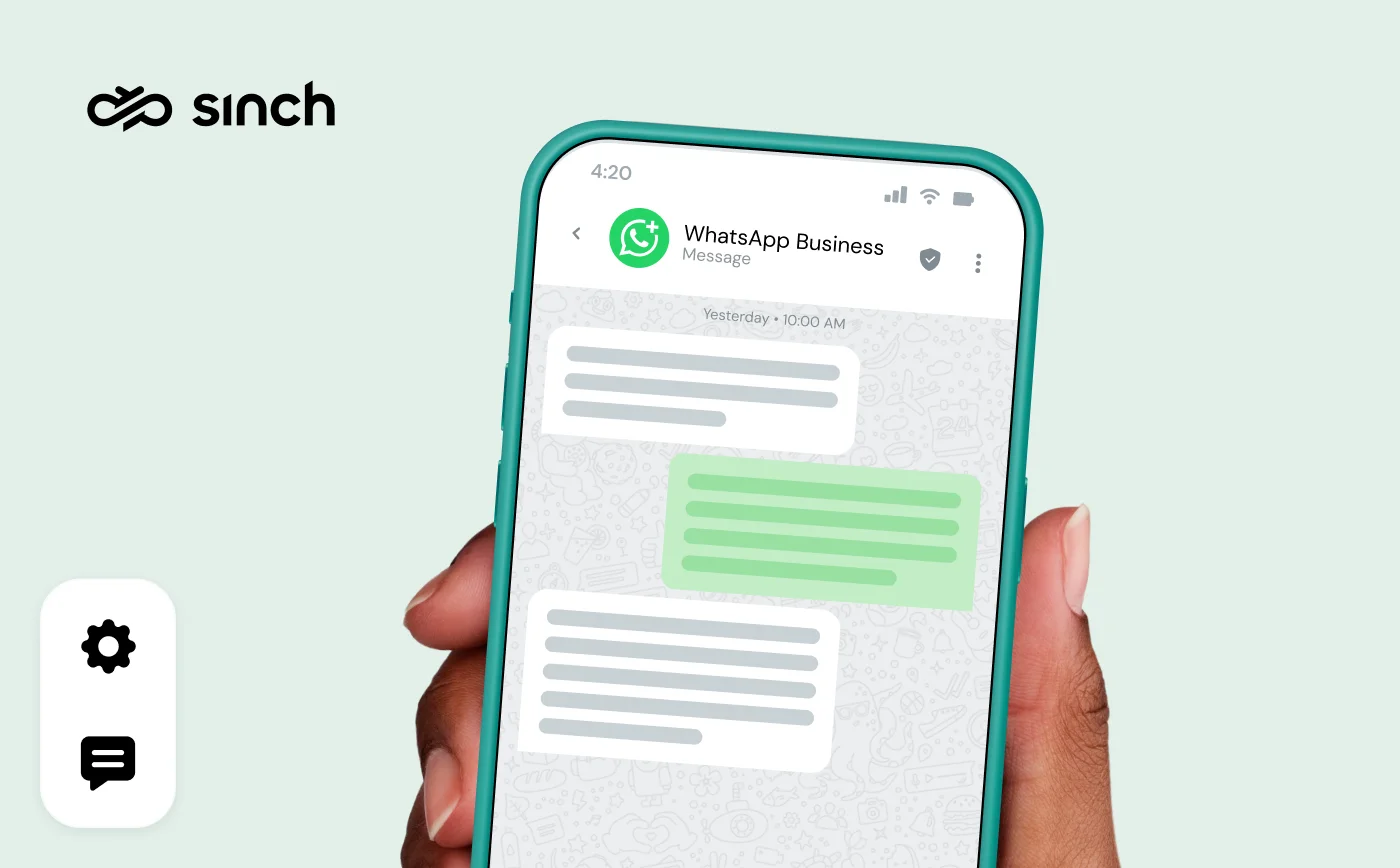
Managing customer conversations at scale on WhatsApp gets tricky – especially when your team grows or your inbox fills up fast. That’s where a WhatsApp Business Account comes in. We’ll break down what a WABA is, how to set it up, and how to access features like chatbots, templates, and Flows to run efficient, high-impact messaging campaigns.
WhatsApp is the world’s most popular messaging platform, reaching three billion users each month. And with 175 million consumers preferring to message brands directly on the green messaging platform, WhatsApp represents a huge opportunity to connect with customers where they already spend their time.
In WhatsApp-first countries like Mexico, Brazil, or Spain, 30% of consumers name WhatsApp as their preferred channel to receive promotions – showing the enormous business potential the channel holds.
Once you start exploring WhatsApp for business use, though, the options quickly get confusing. Why are there different types of WhatsApp accounts? What’s the difference between the Business app and the Business Platform? What features can you use as a business?
This guide will explain what a WhatsApp Business account is, how it works, and what companies need to know to get started.
What is WhatsApp Business?
When people talk about “WhatsApp Business,” they’re often referring to different tools, use cases, or even apps entirely – and that’s where the confusion starts.
WhatsApp for Business is the umbrella term for all the business-facing solutions WhatsApp offers. These include:
- WhatsApp Business app: A free mobile app available on Android and iOS through the Google Play Store and app store for small teams (one to five users), with limited business features and no automation. This replaces the standard WhatsApp messenger for business use.
- WhatsApp Business Platform (API): A scalable, programmatic solution for mid-sized to large businesses that offers advanced business tools and authentication capabilities.
- Click-to-WhatsApp ads and chat links: Tools to help customers start a conversation with your business.
You’ll also hear “WhatsApp Business” used loosely to describe any business use of WhatsApp. You might also come across the term WhatsApp Business Solution Providers (BSPs) – official partners who help you access the API directly or through no-code platforms, depending on your technical needs.
And lastly, there’s also the acronym WABA which is just short for WhatsApp Business account. That refers to the actual account you must register to use WhatsApp commercially, regardless of which tool you plan to use. You can’t use a personal WhatsApp number for business.
That’s exactly what we’ll focus on in this guide.
The bottom line: Before you choose a WhatsApp Business option, get clear on what you actually need within the large WhatsApp ecosystem.
What is a WhatsApp Business account?
A WhatsApp Business Account (WABA) is your official business identity on WhatsApp. You need it to send and receive customer messages, create templates, and access key features whether you’re using the WhatsApp Business app or the API.
There are several ways to create a WABA, depending on how you plan to use WhatsApp for your business:
- Use the WhatsApp Business app: Download the free app from the Google Play Store or app store, verify a business number (VoIP and personal numbers are not allowed), and set up your WhatsApp Business profile. Configure your display name, profile picture, business hours, and welcome message. This option is quick but limited to small-scale use without any automation, APIs, or integrations.
- Register through a Solution Provider: If you’re using an API-based platform like Sinch, generate a WABA via the Sinch Dashboard (for developers) or automatically when signing up for Sinch Engage, our ready-to-use business messaging tool. Most providers will guide you through an embedded signup flow, which gathers your business details and connects your WABA to their platform.
- Set one up via Meta Business Suite: This method is gradually rolling out and may not yet be available in all regions (refer to Meta documentation for more info). Currently, it’s not supported for businesses with addresses in Brazil or India. If available, create a WABA from the Meta Business Suite by navigating to Settings → Accounts → WhatsApp accounts.
If you’re working with a Solution Provider and already set up an account, share your WABA with them using Meta Business Suite by assigning their Business ID and choosing appropriate permissions. The partner can then manage templates, send messages, and monitor performance on your behalf.
What are the different types of WhatsApp Business accounts?
WhatsApp offers two types of business accounts: regular business accounts and official business accounts.
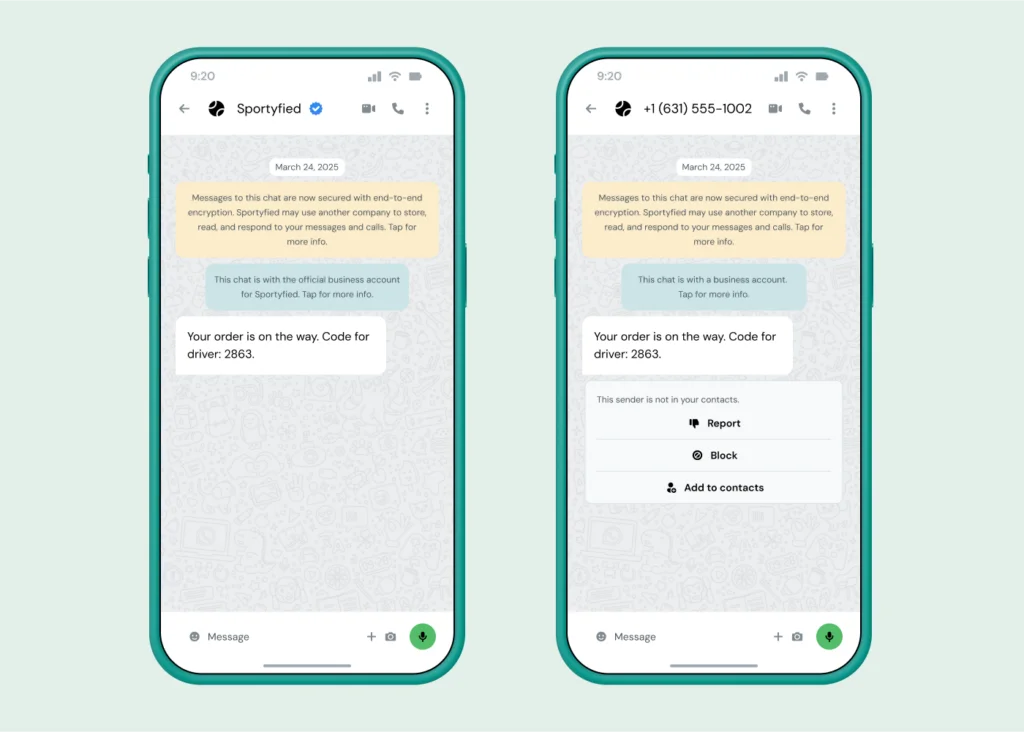
- Regular business accounts: These display your business phone number and basic profile information. Anyone can create these through the WhatsApp Business app.
- Official business accounts: These feature the coveted blue checkmark (formerly: green tick) and also display your business name (rather than an unknown number). Verified WABAs also don’t automatically trigger “Report” or “Block” buttons. This verified badge signals to customers that your account is authentic and trustworthy.
The blue checkmark boosts customer confidence and can improve message open rates.
To get official status, your business must meet specific criteria, including having an established online presence, consistent branding, and showing legitimate business operations. And you need to be an API user or pay for a Meta Verified subscription.
To verify your account, submit documentation for Meta’s review. If you’re working with a BSP, they can also help you with the process.
For detailed steps on obtaining verification, check out our comprehensive guide.
What can you do with a WhatsApp Business account?
A WhatsApp Business account gives you access to practical tools for reaching customers in a more direct, scalable, and engaging way.
That said, most advanced features like automation, templates, and rich media are only available through the WhatsApp Business API, which you can access via a Business Solution Provider.
Below, we’ll walk through the core features that businesses rely on to boost engagement and streamline operations.
1. Scale marketing messages
With a WhatsApp Business account, send marketing campaigns at scale using:
- Message templates (API-only)
- Broadcasts
- Automation tools (API-only)
Share personalized updates, product launches, or promotional offers with thousands of opted-in users (always make sure to get permission first, before sending out promotions to users!) without manual effort. Features like quick replies, rich media, and interactive buttons make it easier to drive action while keeping your messages clear and engaging.
2. Engage in personalized two-way conversations
Have real, one-on-one conversations with customers at scale. Use tools like custom replies, chat labels, and CRM integrations (API-only) to keep context and deliver tailored responses.
Whether you’re answering questions, offering recommendations, or providing support, every conversation feels direct and human without sacrificing efficiency.
Build and share a mobile-friendly product catalog that lives directly inside the chat window. Each item can include an image, description, price, and optional link to a payment page, product detail, or website checkout so customers can explore your offerings without leaving the conversation.
For example, if someone asks about available shoe colors, send the specific product with a quick tap.
It’s a great feature if you want a lightweight storefront experience without the need for a full e-commerce site. It also saves time by making it easy for your team to respond to product questions with visuals, not just words.
4. Build WhatsApp Flows
WhatsApp Flows lets you design structured, interactive experiences like forms, bookings, or data collection directly within a WhatsApp chat using a simple visual builder.
Messages, buttons, or bots trigger each Flow, making it feel like a natural part of the conversation. Use Flows to qualify leads, collect delivery info, confirm appointments, or even onboard new customers.
To build Flows, you’ll need access to the WhatsApp Business Platform, typically through a Business Solution Provider like Sinch.
5. Use WhatsApp templates
WhatsApp template messages, also known as highly structured messages (HSMs), are pre-approved messages that businesses use to start conversations on the WhatsApp Business Platform. These templates can include text, media, buttons, and personalized variables like names or appointment times.
They’re required for all business-initiated messages, whether you’re sending updates, offers, or confirmations. WhatsApp reviews each template to reduce spam and ensure a good user experience.
You’ll need opt-in before sending, and templates only work with the Business API, not the WhatsApp Business app.
6. Use automations
Automations help you scale customer communication without adding extra workload. With the WhatsApp Business Platform, you can set up auto-replies and trigger-based messages that respond instantly to common questions, order updates, or form submissions.
For example, automatically confirm appointments, send shipping notifications, or follow up on abandoned carts – no manual action needed. Automations ensure that customers get timely, consistent responses while your team focuses on more complex tasks.
Most automation features only work with the WhatsApp API.
7. Click-to-WhatsApp links and ads
Click-to-WhatsApp lets users open a chat with your business instantly – via a link or ad – on mobile or desktop. Place chat links on your website, email, or social posts, or run targeted click-to-WhatsApp ads on Facebook and Instagram through Meta Ads Manager.
These drive engagement and let you start conversations with a pre-filled message. You can also pair them with automation to handle volume, qualify leads, and lower your customer acquisition costs.
8. Integrate chatbots
A WhatsApp chatbot is a virtual assistant that helps you automate conversations – whether it’s answering FAQs, capturing lead details, sending delivery updates, or sharing personalized offers. It runs on the WhatsApp Business Platform, not the free Business app, and is ideal for businesses handling high message volumes.
Chatbots free up your team, ensure 24/7 availability, and boost efficiency by up to 80%. They also help personalize customer interactions and streamline your sales funnel.
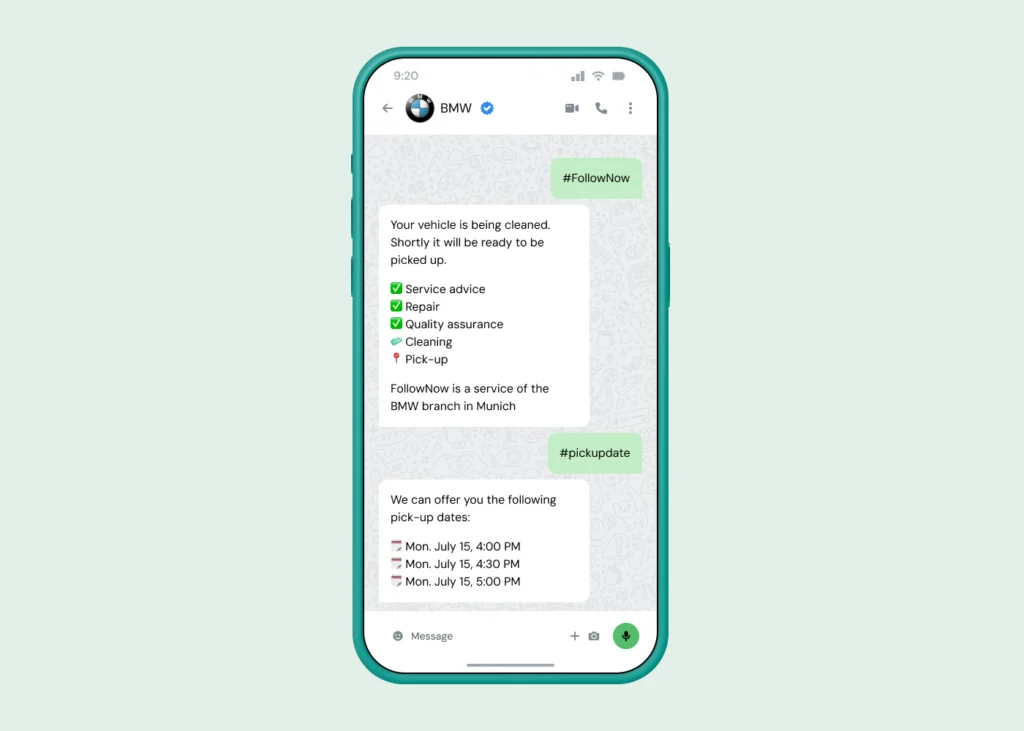
9. Link your WhatsApp Business account to other MarTech tools like Shopify, HubSpot, or Zoho
Connecting WhatsApp Business to your existing marketing tech stack makes it easier to automate tasks, personalize communication, and track results across channels.
With integrations for platforms like Shopify, you can send order updates, abandoned cart reminders, or shipping confirmations via WhatsApp. Tools like HubSpot or Zoho let you sync conversations with your CRM, assign contacts to sales reps, and trigger messages based on user behavior.
These connections help you run smarter campaigns, reduce manual work, and keep customer data aligned so every WhatsApp conversation feels timely and relevant.
Want to integrate WhatsApp into your MarTech stack? Check out Sinch Engage’s 80+ integrations that let you keep using the tools you know and simply enhance them with WhatsApp.
10. Receive payments directly on WhatsApp
In select markets like India and Brazil, WhatsApp supports native payment features that let customers complete purchases directly in the chat.
This means your customers can browse a catalog, ask questions, and pay without leaving WhatsApp. To use this feature, you’ll need to link a supported bank account and follow local verification steps. While still limited by region, it’s a powerful preview of where conversational commerce is heading.
What about compliance?
WhatsApp Business can be compliant, but only with the right solution.
The WhatsApp Business app violates data compliance rules in several major markets. In the E.U. and U.K., the app’s automatic contact syncing breaches GDPR and Data Protection Act requirements. Brazil has similar restrictions, and the U.S. Federal Trade Commission Act has usage limitations that can create legal headaches.
Here’s the problem: When you use the free app, WhatsApp stores your business data on servers that may not meet local data protection standards. Your customer conversations, contact lists, and business information could be processed in ways that violate regional privacy laws.
In contrast, when using the API and / or working with a solution from a BSP, you can set up guardrails that guarantee data compliance, even for the strictest markets.
If you want to guarantee compliance, choose a provider that offers security at scale and understands local regulations. Look for solutions that provide data residency options, proper encryption, and clear data processing agreements.
With Sinch’s WhatsApp solutions, you get a safe, secure, and 100% compliant platform that meets regulatory requirements across all major markets while giving you the advanced features you need to scale.
How can I use a WhatsApp Business account? 5 examples to get you started
A WhatsApp Business account helps large and small businesses handle customer communication directly from their mobile phone. Features like away messages, dropdown reply options, and automation features simplify how you use the messaging app. Here are five real-life examples for inspiration to help you get started.
BUT boosts engagement
BUT, one of France’s top home furnishing retailers, wanted to reduce its reliance on printed catalogs and deliver a more engaging, environmentally-friendly customer experience. Their goal: meet shifting consumer preferences, cut printing costs, and adapt to new regulations that limit unsolicited advertising.
Instead of direct mail, BUT used WhatsApp to share weekly digital catalogs. WhatsApp’s ease of use and interactivity led to a 75% read rate, 57% click-through rate, and three times more traffic on their catalog landing pages. For BUT, WhatsApp gave them a better-performing, data-rich channel to connect with shoppers.
MissPompadour drives sales
MissPompadour, a Berlin-based DIY paint retailer, uses WhatsApp as a direct customer consultation tool and customer support channel. Instead of lengthy phone calls, the team offers real-time, personalized guidance through WhatsApp messages on color selection, finishes, and product recommendations.
Customers can send photos through WhatsApp messenger, describe their project, and get advice from a real expert – right in the chat. The business maintains professional communication with a clear display name and business profile, complete with business hours and a welcoming profile picture that builds trust.
The result: Nine out of ten WhatsApp chats end in a sale.
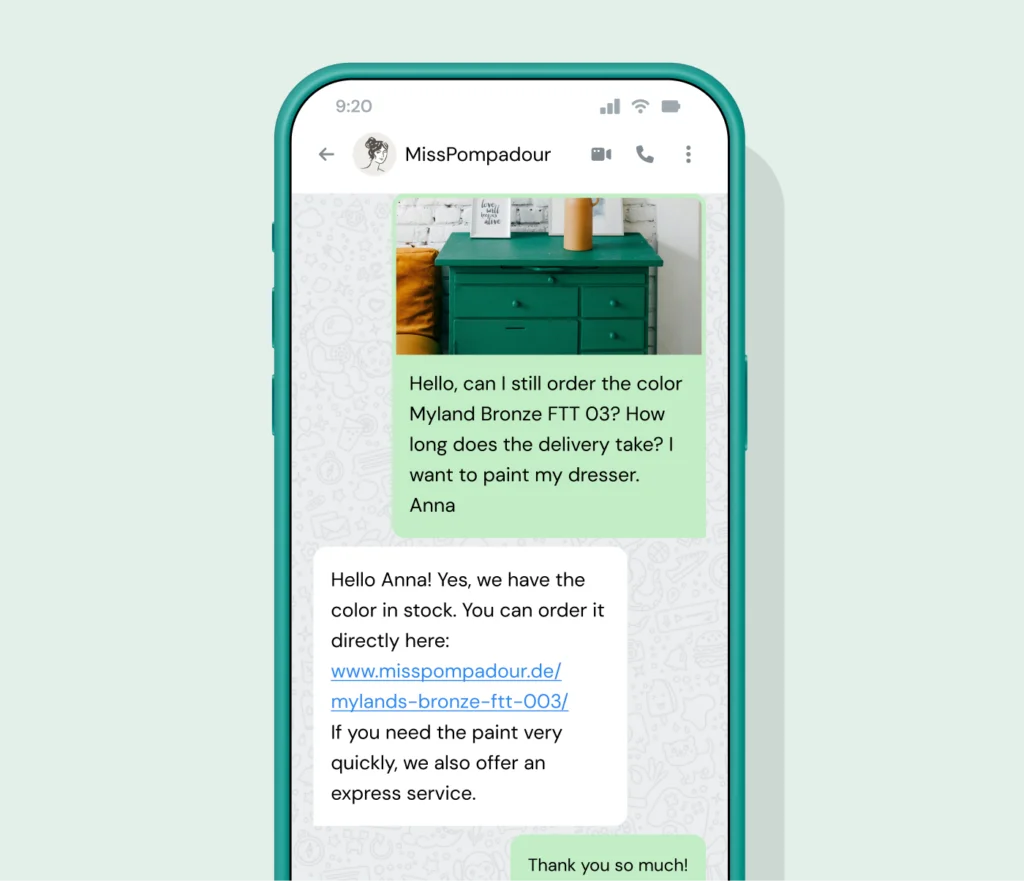
Orion’s chatbot increases visitor numbers
Orion Mall, one of Bangalore’s largest shopping destinations, was facing the same problem many malls are today: declining foot traffic and limited ways to reach potential visitors in real time. To improve both reach and experience, they launched Orion Genie, a 24/7 WhatsApp chatbot built with Sinch’s Chatlayer.
The bot answers FAQs about store hours, promotions, food options, and events, offering fast, accurate info right when customers need it. With over 3,500 monthly conversations and 2,000+ active users, Orion Genie quickly added value to Orion Mall’s marketing.
Salud Digna enables appointment bookings with WhatsApp
When the pandemic hit, Salud Digna – a nonprofit providing low-cost healthcare across Mexico – faced a tidal wave of patient inquiries. With limited staff and stringent mobility restrictions, they needed a way to serve millions without overwhelming their call centers.
Their solution was a WhatsApp-based virtual assistant built with Sinch. The chatbot helped patients book lab appointments, check test results, and get answers to common questions, all from their phones.
The impact was massive: 89% of questions were handled without a live agent, and call center productivity jumped by 30%.
Magalu’s WhatsApp Flows keep users from leaving
Consórcio Magalu, one of Brazil’s largest consumer finance companies, was losing nearly all of its potential leads during the booking process. Customers had to leave WhatsApp and navigate a mobile website just to schedule a meeting. That extra step led to a 92% abandonment rate.
To fix this, the company worked with Sinch to redesign the entire booking journey using WhatsApp Flows. Instead of redirecting users, the new flow kept everything inside the chat from browsing loan offers to choosing a meeting time and format.
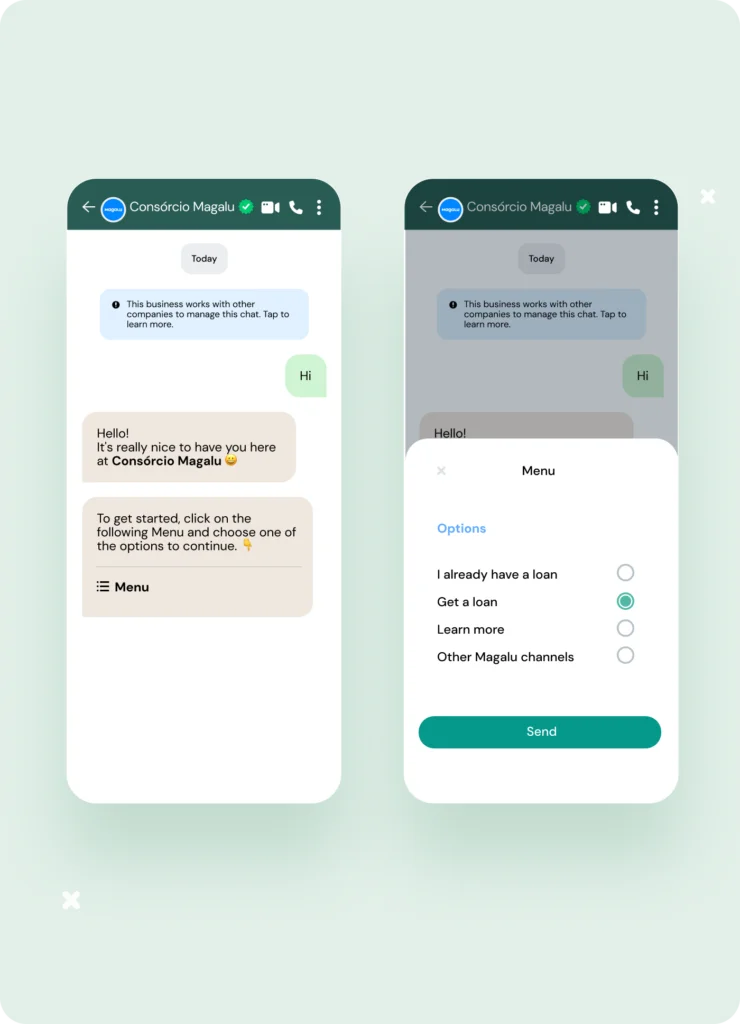
The impact was immediate: almost three times more conversions from organic visitors, 49% more from paid traffic, and a 21% boost in customer satisfaction.
First steps in getting started with WhatsApp Business
With sky-high engagement rates and powerful features like automation and templates, WhatsApp is an essential channel for customer communication.
To get started, you’ll need a WhatsApp Business Account (WABA), which you can create using the WhatsApp Business App, Meta Business Suite, or through a Business Solution Provider like Sinch.
To learn more about WhatsApp for Business, check out our step-by-step guide to business messaging, or reach out directly to our team.

